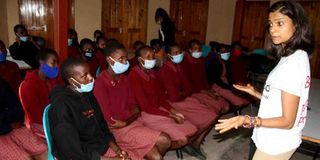Let youth make choices

Dr Madhvi Dalal speaks to pupils of Mara Girls' Leadership Primary School, in Narok West Sub-county on February 13, 2021.
At one point, every young person grapples with the various physical, emotional and social decisions associated with sex and sexuality.
Consequently, the secrecy and shame that discourage open and honest conversations about the subject does not promote abstinence among youth, but rather forces them to seek guidance from unverified and untrustworthy sources.
Our education system does not have a comprehensive sexuality curriculum that focuses on a holistic and age-appropriate approach in educating young people about bodily autonomy, sex and relationships, family planning and more. The information that they have is, therefore, shallow and inadequate and is often overshadowed by the myths and misconceptions about family planning.
Family planning goes beyond preventing unintended pregnancies through contraceptive use. It also enables women to live healthier lives with equal opportunities to pursue education and career goals.
Sunday was World Contraceptive Day, when the world consolidates efforts and raises awareness of the various family planning options available to women and men, thus enabling them to make informed choices regarding their reproductive health.
Reproductive health
This year, the campaign is encouraging stakeholders to ensure no one is left behind in light of a pandemic that has disrupted supply systems and seen funds redirected from reproductive health programmes to Covid-19 response.
More than half of the population is young. They make up a vital demographic that must not be denied the chance to choose whether or not they want to be parents. We must also dispel the notion that a young person who is sexually active is immoral.
UNFPA links the high unmet need for family planning among sexually active young people aged 15-24 directly to the many cases of teenage pregnancy. With the highest childbearing rates in Africa, a strategy that involves placing youth at the forefront of their reproductive health is the only way to go.




